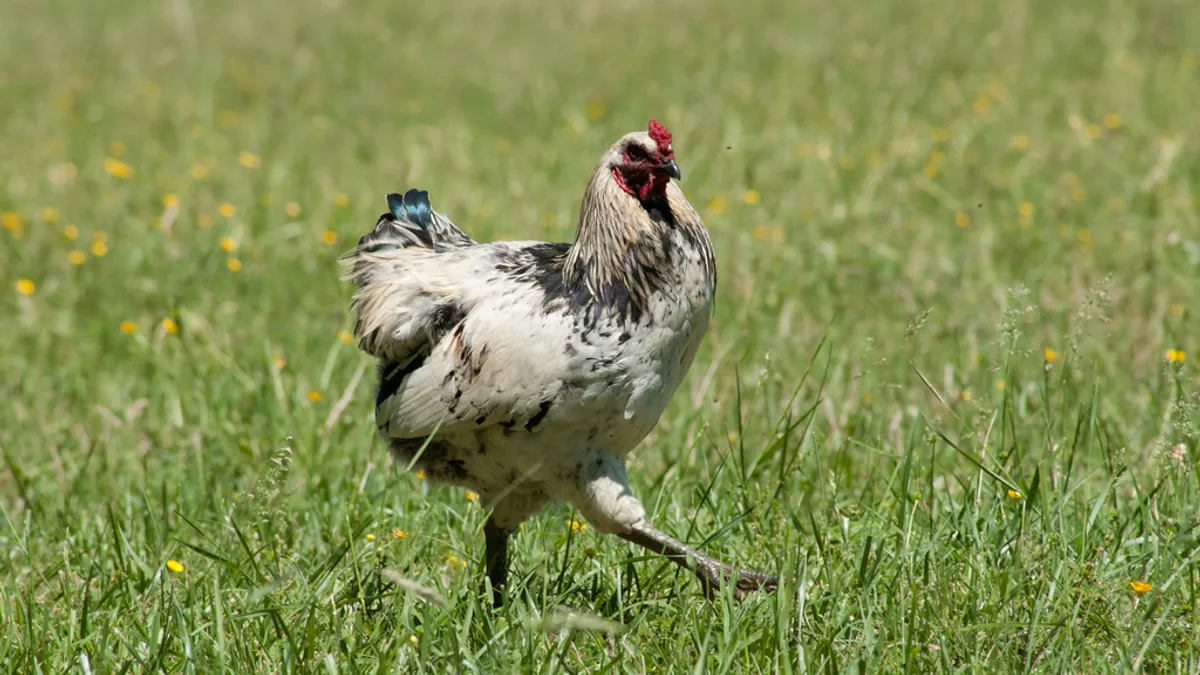Dive Brief:
- Seattle-based PCC Community Markets announced a commitment to improving chicken welfare by meeting the standards of Compassion in World’s Farming’s Better Chicken Initiative and the Joint Animal Protection Organization Statement on Broiler Chicken Welfare, according to a company statement.
- The community-owned market says it is the first in the U.S. to comprehensively address chicken welfare — not only for fresh and frozen products, but also for ready-to-eat chicken. In late May, the company will begin selling its own line of organic, air-chilled chicken in partnership with Pitman Farms.
- By 2024, PCC pledges to transition to strains of birds that demonstrate higher welfare outcomes; provide birds enhanced environments with litter, lighting and enrichment that meet industry standards; process chickens in a way that avoids pre-stun handling; and demonstrate compliance with the new standards through a third-party auditor.
Dive Insight:
Those who are concerned with animal welfare are thrilled to see PCC taking on the new standards — an unusual move for a store, not a food producer, to make.
“As the first retailer to commit to improving broiler chicken, PCC furthers its strong and longstanding commitment to farmed animal welfare,” said Katya Simkhovich, Food Business Manager with Compassion in World Farming, in a statement in The Shelby Report. “We are thrilled to have PCC as a partner in continuing to push the needle meaningfully forwards on broiler chicken animal welfare.”
PCC already sets its standards high. More than 95% of produce it sells is organic; its meats are 100% organic, non-GMO or grass-fed; and its seafood is sustainably sourced. And the store’s commitment goes beyond food. When selecting health and hygiene products to sell, PCC won't sell things containing more than 500 components that are commonly allowed by other retailers.
As a hyper-local co-op owned and managed by members, PCC has the support to insist on super high standards, even for its own private-label chicken line. Members are not looking to earn returns on investments that others in the grocery business must consider in a competitive market.
In fact, products that meet high standards are the reason members come to PCC in the first place. For the cost of a $62 lifetime membership, the “owners” of PCC know profits are plowed back into the store. As the co-op's website notes, they expect managers to meet the triple bottom line of economic, social and environmental responsibilities set when the organization began as a food-buying club for a small group of families in 1953. Insisting on higher chicken standards — and even starting its own chicken brand — appeals to customers who are willing to pay premium grocery prices.
The Seattle store’s move to ensure high standards for the chicken it sells comes at a time when large producers and sellers have a long way to go. Many major grocers are stumbling in efforts to market and sell antibiotic-free chicken brands. The National Resources Defense Council found the top five U.S. grocery chains selling chicken — Costco, Albertson’s/Safeway, Publix, Walmart and Kroger — have not pledged to address antibiotic overuse in poultry produced for and sold in their stores. While producers could change their views as consumer calls for sustainability and healthful food grow, food retailers have a long way to go before they not only care about antibiotic use, but also the lives chickens led before being processed.
The future of organic, cage-free or free-range chickens sold in stores depends on customer demand and their willingness to pay more. Cage-free chicken costs about $5 a pound, compared with about $2 a pound for caged chicken, Diffen reports. PCC’s call for higher standards, already backed by its members, is likely to serve the store’s customers well. Many challenges, including lack of retailer interest, remain before the concept can be scaled industrywide.








